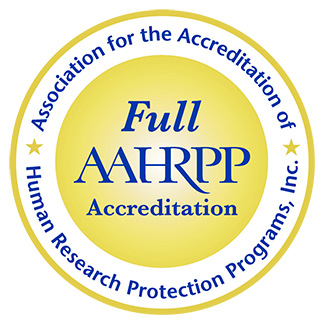
The Human Research Protection Program (HRPP) at WMed has been awarded full reaccreditation by the Association for the Accreditation of Human Research Protection Programs (AAHRPP) for an additional five years.
AAHRPP promotes high quality research through an accreditation process that helps organizations worldwide strengthen their human research protection programs. The medical school’s human research protection program was reaccredited in June, following a two-day site evaluation that took place in February and March. During the site visit, AAHRPP site visitors from accredited peer institutions reviewed HRPP and Institutional Review Board (IRB) records and research policies, and conducted interviews with more than 40 researchers, administrators, and IRB members and staff involved in supporting the WMed HRPP.
AAHRPP uses a voluntary, peer-driven, educational model to ensure that human research protection programs meet rigorous standards for quality and protection that go beyond the regulations. To earn accreditation, organizations must demonstrate through policies, procedures, and practices their commitment to ethical research and continuous quality improvement. AAHRPP-accredited organizations collaborate and share resources, innovative practices, and collect data to help establish benchmarks, improve quality, and increase effectiveness and efficiency.
“This important achievement reflects our commitment to protecting the rights and welfare of research participants,” said Greg Vanden Heuvel, the medical school’s associate dean for Research. “Becoming accredited is a remarkable achievement and a true testament to what we can accomplish together. It is representative of the different areas that collectively help make our HRPP successful.”
AAHRPP evaluators recognized as one of the WMed HRPP areas of strengths the individuals who make up research operations and their commitment and dedication to educate, engage, and partner with the community regarding human research opportunities. An additional area of strength that was noted was the level of engagement by each person who was interviewed and being well positioned to support WMed’s continued growth.
“We could not have achieved this success without the continued support, dedication, and determination from all parties involved in our HRPP, which includes faculty investigators, research staff, IRB members and staff, and leadership,” HRPP Director Maureen Owens said.
